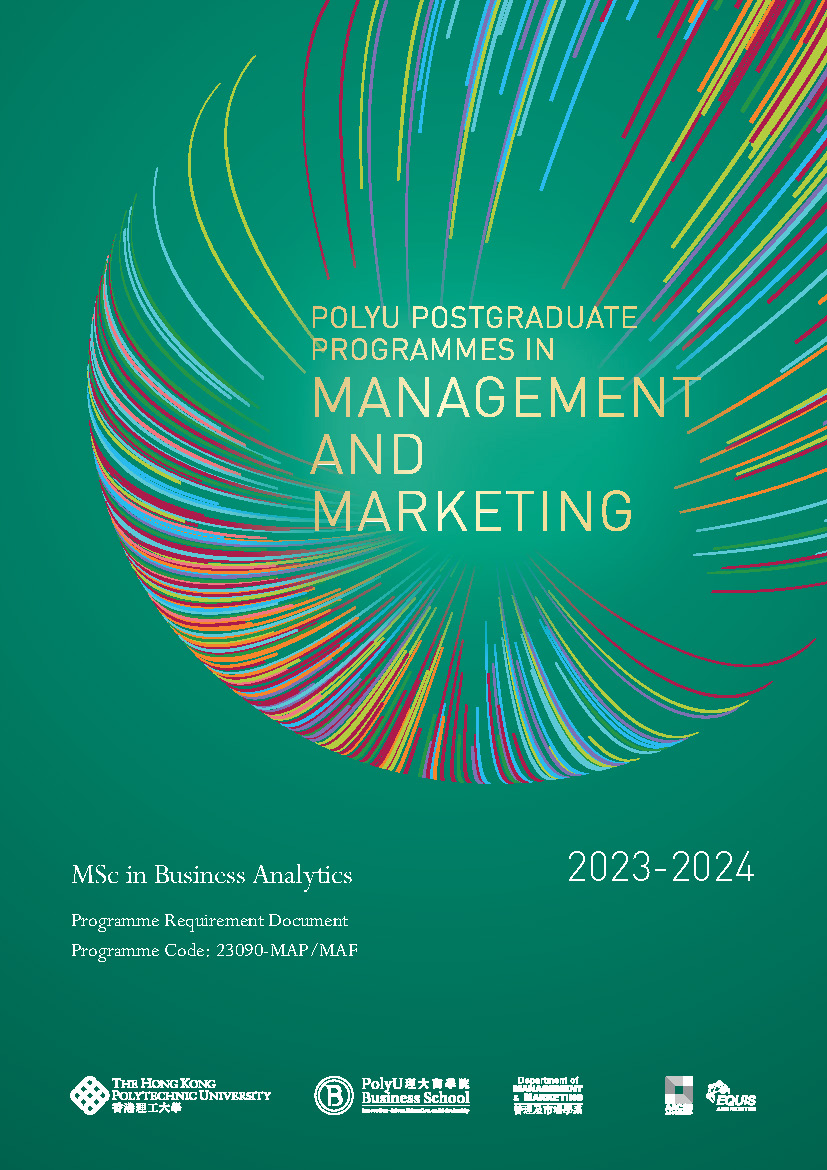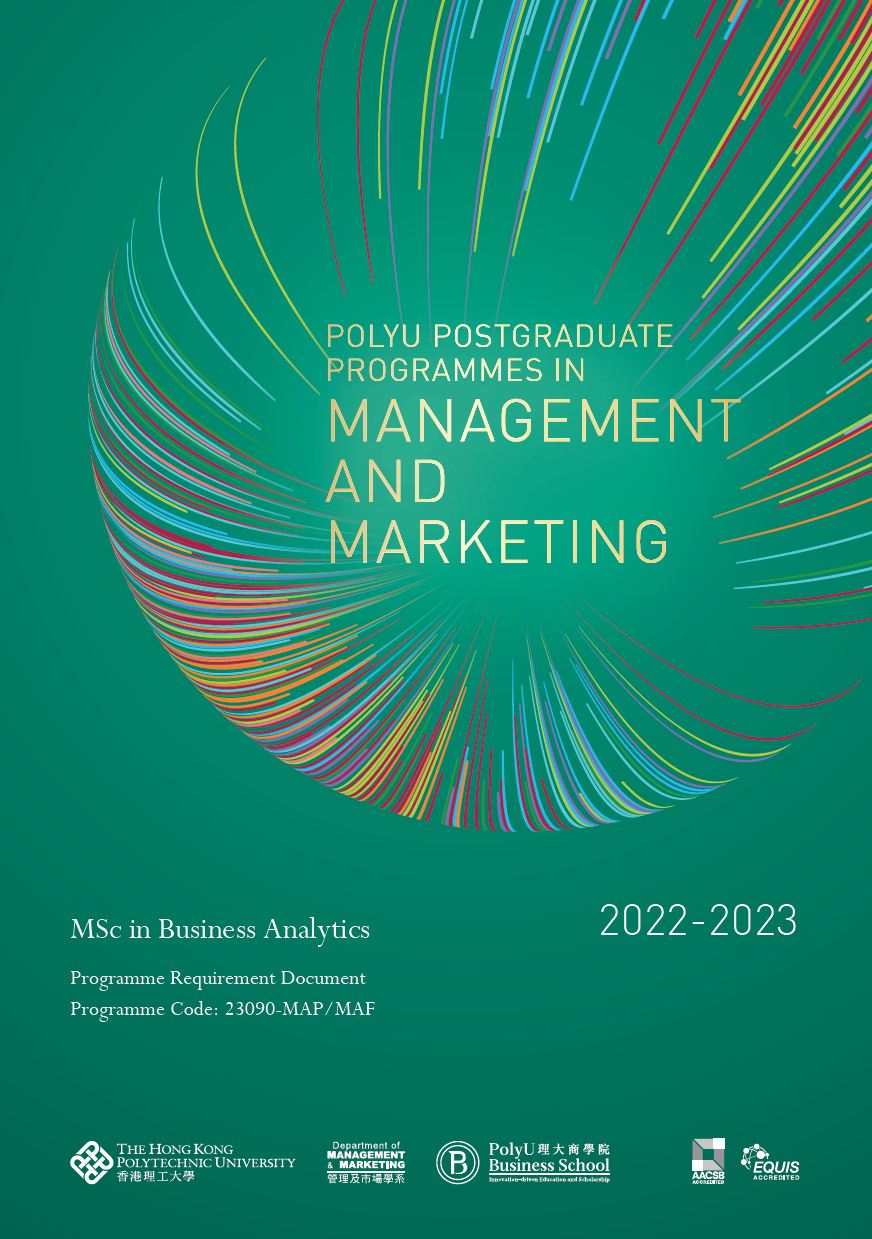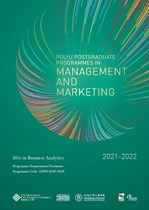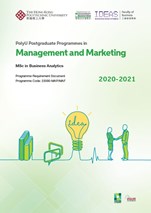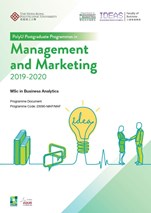From 2024/25 Cohort onwards
- MM5112 Organization and Management*
- MM5412 Business Intelligence and Decisions*
- MM5424 Management Information Systems*
- MM5425 Business Analytics*
- MM5T21 Academic Integrity and Business Ethics (non-chargeable)
Non-Dissertation Option
- MM501 Research Methods
- MM5203 Decision Making for Leadership
- MM531 Strategic Management
- MM534 Entrepreneurship
- MM5413 Business Forecasting
- MM5426 Business Applications of Blockchain
- MM5427 Textual Analysis in Business
- MM5433 Decision Analytics by Machine Learning
- MM544 E-Commerce
- MM5451 Technology Innovation and Management
- MM5452 Seminars in Emerging Technology
- MM576 Marketing Management
- MM5831 Social Media Marketing
- LGT5102 Models for Decision Making
- LGT5105 Managing Operations Systems
- LGT5113 Enterprise Resource Planning
- LGT5122 Applications of Decision Making Models
- MM5913 Field Study for Business Management
- MM5400 Launchpad to Advanced Analytics (0 credit)
- MM5995 MM MSc Career Workshop (0 credit)
Dissertation Option
- MM501 Research Methods (3 credits)
- MM594 Business Analytics Dissertation (9 credits)
- MM5203 Decision Making for Leadership
- MM531 Strategic Management
- MM534 Entrepreneurship
- MM5413 Business Forecasting
- MM5426 Business Applications of Blockchain
- MM5427 Textual Analysis in Business
- MM5433 Decision Analytics by Machine Learning
- MM544 E-Commerce
- MM5451 Technology Innovation and Management
- MM5452 Seminars in Emerging Technology
- MM576 Marketing Management
- MM5831 Social Media Marketing
- LGT5102 Models for Decision Making
- LGT5105 Managing Operations Systems
- LGT5113 Enterprise Resource Planning
- LGT5122 Applications of Decision Making Models
- MM5913 Field Study for Business Management
- MM5400 Launchpad to Advanced Analytics (0 credit)
- MM5995 MM MSc Career Workshop (0 credit)
2023/24 Cohort
- MM5112 Organization and Management*
- MM5412 Business Intelligence and Decisions*
- MM5424 Management Information Systems
- MM5425 Business Analytics*
- MM5021 Business Ethics
Non-Dissertation Option
- MM501 Research Methods
- MM5203 Decision Making for Leadership
- MM531 Strategic Management
- MM534 Entrepreneurship
- MM5413 Business Forecasting
- MM5426 Business Applications of Blockchain
- MM5427 Textual Analysis in Business
- MM5433 Decision Analytics by Machine Learning
- MM544 E-Commerce
- MM5451 Technology Innovation and Management
- MM5452 Seminars in Emerging Technology
- MM576 Marketing Management*
- MM5831 Social Media Marketing
- LGT5102 Models for Decision Making
- LGT5105 Managing Operations Systems
- LGT5113 Enterprise Resource Planning
- LGT5122 Applications of Decision Making Models
- MM5913 Field Study for Business Management
- MM5400 Launchpad to Advanced Analytics (0 credit)
- MM5995 MM MSc Career Workshop (0 credit)
Dissertation Option
- MM5203 Decision Making for Leadership
- MM531 Strategic Management
- MM534 Entrepreneurship
- MM5413 Business Forecasting
- MM5426 Business Applications of Blockchain
- MM5427 Textual Analysis in Business
- MM5433 Decision Analytics by Machine Learning
- MM544 E-Commerce
- MM5451 Technology Innovation and Management
- MM5452 Seminars in Emerging Technology
- MM576 Marketing Management*
- MM5831 Social Media Marketing
- LGT5102 Models for Decision Making
- LGT5105 Managing Operations Systems
- LGT5113 Enterprise Resource Planning
- LGT5122 Applications of Decision Making Models
- MM5913 Field Study for Business Management
- MM5400 Launchpad to Advanced Analytics (0 credit)
- MM5995 MM MSc Career Workshop (0 credit)
- MM501 Research Methods (3 credits)
- MM594 Business Analytics Dissertation (9 credits)
2022/23 Cohort
- MM5112 Organization and Management*
- MM5412 Business Intelligence and Decisions*
- MM5424 Management Information Systems
- MM5425 Business Analytics*
- MM5021 Business Ethics
Non-Dissertation Option
- MM501 Research Methods
- MM5203 Decision Making for Leadership
- MM531 Strategic Management
- MM534 Entrepreneurship
- MM5413 Business Forecasting
- MM5426 Business Applications of Blockchain
- MM5427 Textual Analysis in Business
- MM5433 Decision Analytics by Machine Learning
- MM544 E-Commerce
- MM5451 Technology Innovation and Management
- MM5452 Seminars in Emerging Technology
- MM5453 Transformation to Sustainable Smart Cities
- MM576 Marketing Management*
- MM5831 Social Media Marketing
- LGT5102 Models for Decision Making
- LGT5105 Managing Operations Systems
- LGT5113 Enterprise Resource Planning
- LGT5122 Applications of Decision Making Models
- MM5913 Field Study for Business Management
- MM5400 Launchpad to Advanced Analytics (0 credit)
- MM5995 MM MSc Career Workshop (0 credit)
Dissertation Option
- MM5203 Decision Making for Leadership
- MM531 Strategic Management
- MM534 Entrepreneurship
- MM5413 Business Forecasting
- MM5426 Business Applications of Blockchain
- MM5427 Textual Analysis in Business
- MM5433 Decision Analytics by Machine Learning
- MM544 E-Commerce
- MM5451 Technology Innovation and Management
- MM5452 Seminars in Emerging Technology
- MM576 Marketing Management*
- MM5831 Social Media Marketing
- LGT5102 Models for Decision Making
- LGT5105 Managing Operations Systems
- LGT5113 Enterprise Resource Planning
- LGT5122 Applications of Decision Making Models
- MM5913 Field Study for Business Management
- MM5400 Launchpad to Advanced Analytics (0 credit)
- MM5995 MM MSc Career Workshop (0 credit)
- MM501 Research Methods (3 credits)
- MM594 Business Analytics Dissertation (9 credits)
Messages from Alumni

Enroll today
Apply now

Explore the programme
Download Brochure
Subject Syllabi
Download Brochure
General Enquiries
(852) 2766 7381 / (852) 2766 7108
mm.msc@polyu.edu.hk
(852) 2766 7381 / (852) 2766 7108
Your browser is not the latest version. If you continue to browse our website, Some pages may not function properly.
You are recommended to upgrade to a newer version or switch to a different browser. A list of the web browsers that we support can be found here







